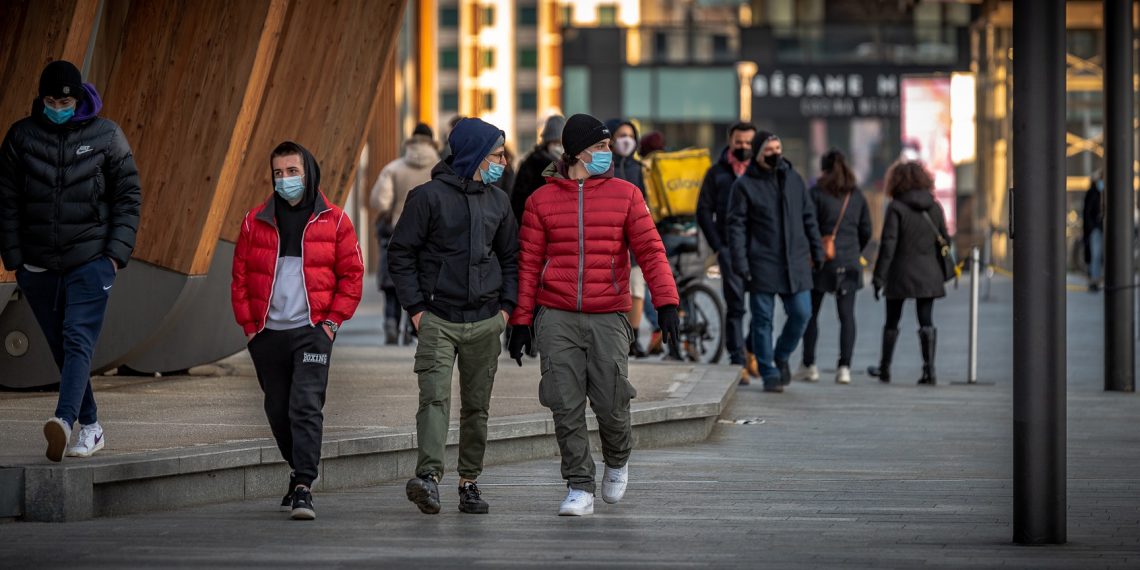How did the lives of Portuguese citizens evolve during and after the second lockdown? The latest data from the Diaries of a Pandemic show that, between early February and the beginning of April, face-to-face work increased by 49%, the vast majority of citizens (90%) wishes to be vaccinated, the number of contacts with people outside the household increased (as well as the trips to the beach and public parks), older people went to supermarkets and non-essential commercial establishments more often, and online orders decreased by less than half.
The latest results of the report include the responses of 3795 participants, aged between 16 and 89, who completed more than 170.000 surveys between February 3 and April 11, 2021.
90% of participants wish to be vaccinated – Face-to-face work increased
Concerning the 10-week period under analysis, nearly 90% of the participants in Diaries of a Pandemic stated that they wish to get the COVID-19 vaccine. This trait was more significant among older people and individuals with higher income.
Between early February and the beginning of April, face-to-face work (away from home) increased 49%, and was more frequent in the Centre and North regions of Portugal, as well as among workers with lower income.
Teleworking, on the other hand, was more common in Lisbon’s Metropolitan Area, among people aged 60 or over, and among those with higher income. During the period under review, there was a global decrease in teleworking by 20%.
Increase in the number of contacts with people outside the household and visits to friends, relatives or colleagues’ homes
Between February and April, the number of citizens with close contacts (less than two meters apart, for 15 minutes) with people outside their household (including professional contacts) increased by 82% (from 33% to 60%). These occurrences were more frequent among participants ranging from 30 to 39 years of age, and among those living in the Centre and North regions of Portugal.
The use of public transportation was low among the participants in the Diaries of a Pandemic, with individuals under the age of 30 and with lower income resorting to this means of transportation more often.
Moreover, visits to friends, relatives or colleagues’ homes increased by 50%, and were more frequent in the North and Centre regions of Portugal, particularly among participants under the age of 30.
Throughout the 10-week period, there was an increase in face-to-face contacts among citizens of all age groups. However, participants aged 60 or older indicated that they had fewer face-to-face contacts with other people (in February, 24% of older people mentioned a total absence of face-to-face contacts).
It is worth pointing out other relevant data, namely the number of contacts via phone or the Internet. In fact, 90% of the participants resorted to these methods to speak to people outside their household, with older people and individuals with lower income claiming they had few contacts like these.
Regarding going out for a stroll or other physical activities, the majority of participants avoided doing so in the beginning of February, despite the increase by 32% until April. Going out for a walk or for exercising was most common among older participants, individuals living in Lisbon’s Metropolitan Area, and people with the highest income. Between early February and April 11, the visits to the beach or public parks more than doubled (from 8% to 17%), and were more frequent among people from Lisbon’s Metropolitan Area.
Trips to healthcare services, for reasons unrelated to COVID-19, and to commercial establishments
The number of trips to healthcare services, for reasons unrelated to COVID-19, decreased by 31% during February, and later increased by 17% until April; these were more frequent among people from the North region and Lisbon’s Metropolitan Area. Trips to pharmacies followed a similar trend, although they were more common than trips to other healthcare facilities, particularly among older individuals.
More than a third of the study participants mentioned going to the supermarket (with the majority avoiding going there in mid-February). Older people went to these commercial establishments more often, as did people living in Lisbon’s Metropolitan Area, and the participants with lower income.
In addition, trips to non-essential commercial establishments were less frequent, but increased four times between February and April (from 4% to 16%). They were most common among older participants and people living in Lisbon’s Metropolitan Area.
Over the 10 weeks analysed, online orders dropped to less than half. Online purchases have always been more common among people aged between 30 and 39, and less common among individuals aged 60 or more.
People should keep participating in Diaries of a Pandemic!
The Diaries of a Pandemic initiative is carried out by the Institute of Public Health of the University of Porto (ISPUP) and the Institute for Systems and Computer Engineering, Technology and Science (INESC TEC), in partnership with the newspaper PÚBLICO.
The second phase of the Diaries of a Pandemic began on February 3, 2021; since then, researchers have been collecting information on how the Portuguese according to a set of situations that may influence the course of the COVID-19 pandemic in Portugal.
In order to participate, people just need to complete the survey: https://diariosdeumapandemia.inesctec.pt/




 News, current topics, curiosities and so much more about INESC TEC and its community!
News, current topics, curiosities and so much more about INESC TEC and its community!